#AKOM
Text
A BEATLE DIDN’T SAY THAT! Lewisohn’s lab-created quotes
“One of the things about this book that is a strength is it’s not me saying anything, it’s them or other people. I shape the text, I plot where it goes, I weave it, but the quotes are theirs. And so when I’ve got Paul McCartney behaving in a way some readers might think, ‘Whatever, oh dear,’ it’s actually him saying it. So you end up thinking that to his own credit he said that. It’s not me saying it.” (Mark Lewisohn, ‘Noted,’ (October 7, 2013) Somerset, Guy.)
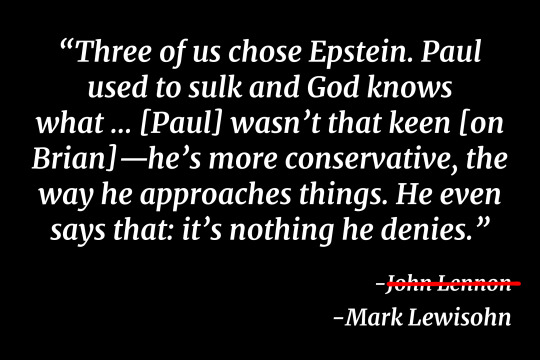
This is hella long, and that's because it's actually a full blog post. (In case you want it in a less monstrous form.)
A lot of people for a long time have put a lot of trust in Mark Lewisohn’s footnotes. Or at least in the fact of those footnotes. Because once you dig through them for any length of time you quickly discover that Mark Lewisohn’s footnotes hold secrets that would get him expelled from any undergraduate program. They reveal a “history” often contrived through a mass of Frankenquotes, ala carte creations, Lewisohn rephrased ‘paraphrases,’ and worse. For some parts of the narrative things aren’t too bad, yet in others monsters lurk around every corner. But this is not the sort of thing that’s graded on a curve, and it is past time to have a conversation about what standards should be accepted in Beatles’ scholarship.
Lewisohn lists his sources unlike most others. And his footnotes alone are more insightful than some other writers’ books. (Reddit, r/beatles)
I do not judge footnotes based on their insightfulness, nor do I want to single out a redditor, but I grabbed the comment because it’s an opinion that is widely shared and even accepted as canon. At least by people who have not combed those freakish footnotes. And while the pages of piled up sources do look fearsome en masse, a closer inspection reveals an offense to the truth, a threat to the record, and a blight on Beatles’ historiography.
“The rules for writing history are obvious. Who does not perceive that its chief law is never to dare say anything false, and never dare withhold anything true? The slightest suspicion of hatred or favor must be avoided. That such should be the foundations is known to all; the materials with which the building will be raised consist of facts and words.” –Cicero
A Look at Lewisohn’s Lab-created Frankenquotes
FIRST, WHAT ARE QUOTES? AND WHY ARE QUOTES?
Quotes are the soul and center of recorded—and recording— history.
And the rules around quotes and quotation marks are pretty simple. Most people, even if they’ve never written anything beyond a term paper, understand what quotation marks represent.
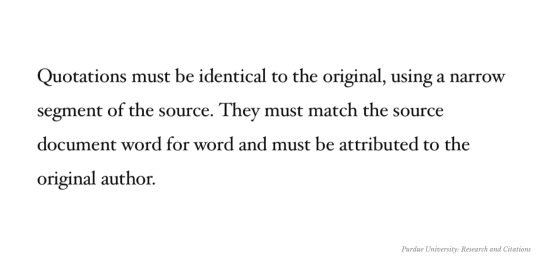
A set of quotation marks means, “This person said or wrote ‘these exact words’ at some given time.” You can smash a quote from two hours before or two years before right up against a separate quote to make your point—although it might get your grade lowered—but what you cannot do is take two different statements from two different times and make them seem like they are one statement.
When you put words inside one set of quotation marks you are stating, in black and white, that the identified person made this statement. That they said all those words together—or if you want to excise a reasonable part and use ellipses to represent that— as part of the same statement.
Look, combining two separate quotes that are not part of the same thought or topic is not a subjective issue. It is not an issue of controversy. Quotes are the bone marrow of written history. Quotes are the alpha and omega. In academic work or journalism they have to be, which makes sense as soon as you think about it. If it was cool for me to take a transcript and grab half a sentence from page 2 and half a sentence from page 17, push them together as if those words were spoken one after the other in a single thought, I bet I can manage to get those words to say almost anything I want.
Separate thoughts must be in two separate quotation marks. Separate. Somewhere between four sentences and a paragraph is widely accepted as the “two separate quotes” line, and there can be some ethical and technical wiggle room in a long rant by a person, but what makes all that subjective nonsense go out the window is if the quotes come from two separate questions. Or two separate days. That’s two quotes. Not hard.

Which again, makes sense if the point is conveying information to the reader and lessening the chance of a writer manipulating someone else’s words to express something that the person didn’t mean.
This is the contract inherent in a quote. These are the rules we all agree to and understand, and these are the reasons why. And there’s no reason to break them.
Why do you want me to believe that John said these two things at one time? What was wrong with what he did say?
THE FOUR MOST COMMON WAYS MARK LEWISOHN MAULS THE MEANING OF THE QUOTE:
The Basic Lewisohn Frankenquote 🧟♂️
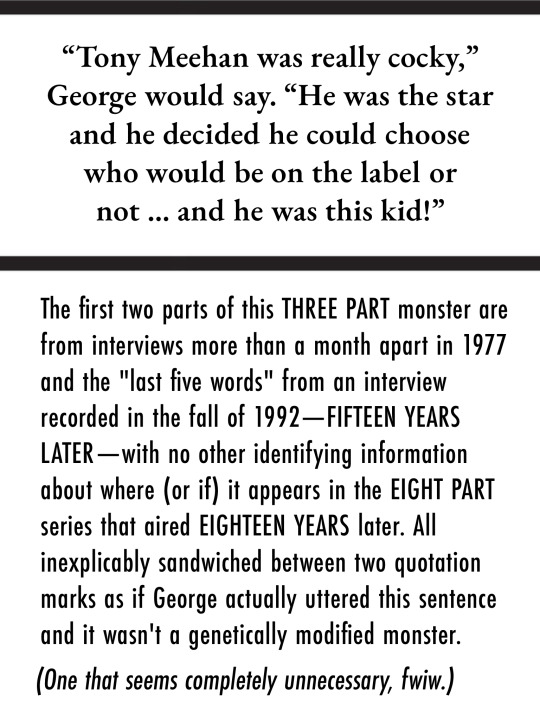
(“CONCLUDING FIVE WORDS FROM—” – I cannot even see the point of this THREE PART monster. Full footnote reads: 9) Author interview with Tony Meehan, September 6, 1995. (“I met George again in 1968 and for some reason he was harboring a grudge against me. He was very, very uptight about it—’You blocked us getting a recording contract …’ ”) First part of George quote from interview by Terry David Mulligan, The Great Canadian Gold Rush, CBC radio, May 30 and June 6, 1977; concluding five words from interview for The Beatles Anthology)
This three-headed monster attributed to George Harrison is a very dull little guy. Not particularly venomous. Just convenient, I guess. For whatever reason, Mark Lewisohn decided it was worth rummaging through the quote buffet until he collected enough pieces for George Harrison to say this thing. “…concluding five words from…” What are we even doing here? No, really. Please tell me.
And like a lot of the footnotes for these bespoke quotations, there are further problems. “[F]rom interview for Beatles Anthology”? An interview that aired? In one of the episodes? Can you narrow it down? I guess I’ll just have to listen very closely to them all and hope I don’t miss the five words.
But if we got bogged down in the sorts of trivial details that would immediately lose a college student a letter grade off a History 101 paper we would never get anywhere. We have to stick to the violent felonies.
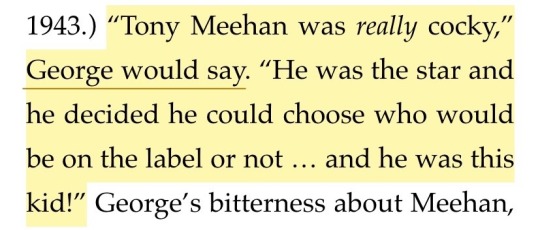
*Love the "George would say——" Uh, would he? Well, I guess after all that trouble you went to, he would now. It's really incredible how cavalier Lewisohn is about a Beatle's words.
These sorts of reconstituted, lab-engineered, made up “quotes” are shot throughout Tune In. “Quotes” made up of words from two, three, and even four sources, spoken months or often years apart.
Ala Carte Creations 🍱
It really is a buffet, and these ala carte creations come in all shapes and sizes. They might just be words that have been plucked up and glued back together to make something more useful to a particular narrative. (Ellipses or dash optional.)
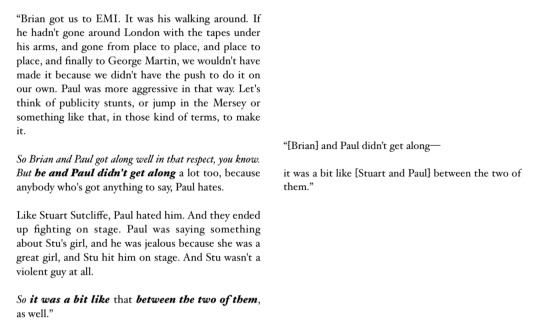
TUNE IN: “John saw a bigger picture, and it would be surprising if it wasn’t equally obvious, or made obvious, to Brian and George. He likened Paul’s enduring snag with Brian to his other long-standing difficulty: ‘[Brian] and Paul didn’t get along—it was a bit like [Stuart and Paul] between the two of them.’” (Footnote 37: Interview by Peter McCabe and Robert D. Schonfeld, September 1971)
Bonus 🍒 Phoebe's dramatic reading of John's original quote:
The Donut 🍩
Then there are a seemingly uncountable number of “quotes” with a sentence or three ripped out from the middle, but with zero representation that more words were ever there. (And in most of these particular deceptions, the simple representation of something excised (. . .) would make the quote fine. There are a lot of these, but they are also the easiest to fix.)

Chapter 10: “I was in a sort of blind rage for two years. [I was e]ither drunk or fighting. **It had been the same with other girlfriends I’d had.** There was something the matter with me.”
And then there are the true buffet bonanzas, words lifted and twisted beyond recognition until they say something brand spanking new.
However, John remembered Paul’s attitude to Brian being very different. John was always emphatic that Paul didn’t want Brian as the Beatles’ manager and presented obstacles to destabilize him, to make his job difficult … like turning up late for meetings. “Three of us chose Epstein. Paul used to sulk and God knows what … [Paul] wasn’t that keen [on Brian]—he’s more conservative, the way he approaches things. He even says that: it’s nothing he denies.”
The Lewisohn Remixes 🍸
And then there are the “paraphrases.” I couldn’t even begin to guess how many of these there are, and often they aren’t even paraphrases, but whole new Mark Lewisohn re-interpretations with quotation marks slapped around them. But if you don’t check, you probably won’t know, because like this Lewisohn rewrite of a well-known Mrs. Harrison quote, there’s a good chance you’ll recognize the bulk of it, making it less likely that you’ll catch the scalpel work excising Paul. And while I don’t want to get caught in the nooks and crannies of intent in an example like this one I have to say, just this once, that what has to be a purposeful excising of Paul to create a slightly new quote on one side, combined with a badly acted, bad faith—(or bad scholar)—“Where was Paul when John’s mom died?” on the other, is par for the course.
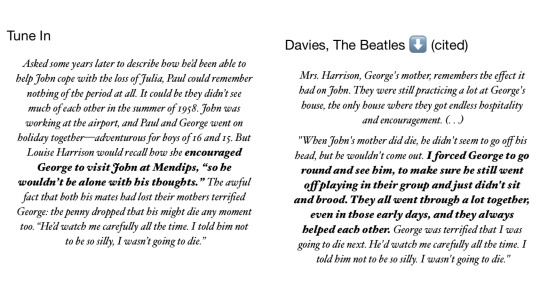
George Harrison’s mom’s made up Lewisohn rephrase which coincidentally removes Paul from the imagery.] ❦ LEWISOHN:“ Asked some years later to describe how he’d been able to help John cope with the loss of Julia, Paul could remember nothing of the period at all. It could be they didn’t see much of each other in the summer of 1958. John was working at the airport, and Paul and George went on holiday together—adventurous for boys of 16 and 15. But Louise Harrison would recall how she encouraged George to visit John at Mendips, “so he wouldn’t be alone with his thoughts.” ❦ DAVIES: “They were still practicing a lot at George’s house, the only house where they got endless hospitality and encouragement. . . . I forced George to go round and see him, to make sure he still went off playing in their group and just didn’t sit and brood. They all went through a lot together, even in those early days, and they always helped each other.”
Why do you have to slice and dice and reconstitute people’s words? No writer, and certainly no historian, should ever feel empowered to take words from a historical figure from two or three different places and topics and times, splice them together, and tell us, “Winston Churchill said this.” No he didn’t! Why are you so intent on changing the words of the people you’re writing about? What’s wrong with just using two different quotes?
You cannot take two or three quotes from two or three or even four separate statements, stick them between one set of quotation marks and say John or Paul or George or Joe Smith said this.
No they didn’t. They never said that. Why do you want me to think they did??
All these words are Abraham Lincoln’s, but this is not a Lincoln quote:
“Every man is said to have his peculiar ambition. Whether it be true or not, I can say for one that I have no other so great as that of — making a most discreditable exhibition of myself.”
(I kept it ridiculous, although I didn’t have to.)
But I want you, the reader, to be saying to yourself, “Okay, enough already. I get it!” Because in the last few days I have wandered too far into the weeds too many times and written far too many words detailing the multiplicity of ways Mr. Lewisohn does violence to each and every law of reporting historical facts, and could write many more. And I will post a more detailed list of the crimes against the quote that I am charging Mark Lewisohn with as we go forward, but I don’t think we need that now. The fact is that every fair-minded person knows what quotation marks represent, and there is no more fair-minded group of people than serious Beatles fans and scholars. And it is those fair-minded scholars who I want most to hear me. Whether you’ve written books or host a podcast or just know that you know a whole lot of stuff and take seriously your part of the trust in preserving the truth about The Beatles for us and future generations, it is you I am really talking to. My Cicero quoting-freaks. The ones who care about getting it right.
“The chief, the only, aim of style is to put facts in a clear light, with no concealment.”
- Lucian of Samosata
What footnotes can do, and what footnotes can’t.
You can list multiple sources in a single footnote. That’s not only fine, it’s correct. If I want to tell part of a story based on several sources, that often means several sources in a footnote. But not for one, single quote.
The problem isn’t the footnote, it’s the bioengineered quote on the page that you swept under a footnote hoping I wouldn’t notice.
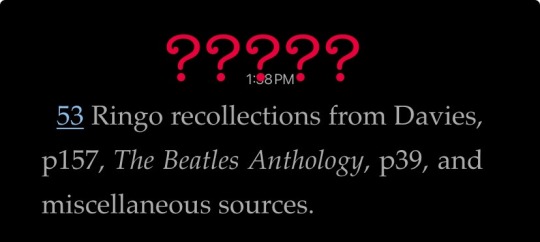
Which leads us to what a footnote is not. A footnote is not a post-hoc fixative for your textual sins. You cannot do whatever you want as long as you confess it in a footnote. A footnote is not a magic spell. A footnote is not the universally understood symbol for “I have my fingers crossed behind my back.” You cannot fix lies and misrepresentations in the footnotes. Footnotes aren’t for trying to chase down three different sources to match up which part of a manufactured “quote” someone said on which date. Footnotes are not the picture on the front of a puzzle box. I should not need to find corner pieces to figure out which of these George Harrison words were actually spoken together.
Footnotes are a truthful and independently verifiable record of primary sources. It’s that simple.
And taking Mark Lewisohn completely out of the picture for a moment, I feel sure we can all agree that neither John Lennon nor Paul McCartney nor George Harrison nor Ritchie Starkey would want anyone rearranging their words as if they were guitar chords. You wouldn’t take three-quarters of Penny Lane and one-quarter of Across the Universe, put them together and call it a Beatles‘ song. So don’t take three quarters of John to Jann Wenner and one-quarter of John to Lisa Robinson, put them together and call it a Beatle’s quote.
MY PERSONAL STANDARD IS THAT IF SOMEONE REPRESENTS, “A BEATLE SAID THIS,” IT BETTER DAMN WELL BE SOMETHING A BEATLE SAID.
None of the Beatles, dead or alive, would be cool with their words being taken out of context at all, let alone two or three different statements on god knows what being combined into one. This isn’t hard, though. Use two or three separate quotation marks, and don’t take statements out of context. Don’t mix and match their words, but don’t twist them, either. If a person said something, it is the historian’s duty to represent those words to the best of your ability, and then use them to tell a factual story focused on what you feel is important. Staying true to the original words and true to their meaning. If you can’t use those words without twisting them, then change your story to fit their words, not the other way around. If their statement helps tell the story your way, use it! For goodness sake, John Lennon said at least two opposing things about almost every topic on earth, so there should be enough to choose from without being deceptive. I actually want the truth. Don’t you?
Biography is story based around accurately represented, trustworthy and verifiable facts. And look, Beatles fans, whoever your favorite is: we are not going to get the truth about his history if we don’t learn to take these things seriously. Let’s have—if not high standards—at least the lowest generally accepted standards. In the mid-term we need a lot more Beatles scholars with a lot more points of view, and now—right now—we need experienced Beatles scholars to prioritize searching out and finding smart, interested people to mentor. And we simply must ensure that we aren’t allowing to solidify into stone “facts” that are not facts and statements no one ever made. I don’t think any honest Beatles fan—(which rounds up to all of them)—wants any question around that issue.
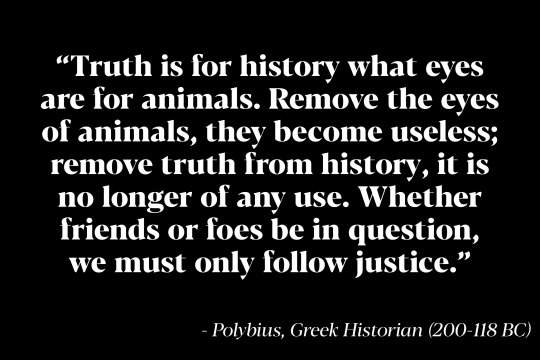
The record is the most important thing. Now, and always. This is not about John versus Paul. John versus Paul may live on always in our hearts, but for Beatles history, it’s the wrong question. I’d rather someone be up front about their loves, but in the end the focus should be on representing the primary facts in their most pristine form. Love who you love most, but place truth above all. Pristine facts. Pristine quotes. Nothing hidden. Nothing misrepresented.
Let the historical actors speak for themselves. That is their right.
And the historian’s duty.
NEXT, WE DISSECT A MONSTER.

Final note: I became frustrated and (maybe strangely) offended by Lewisohn's obscene pretenses in 2020, but my frustrations were nebulous and unfocused until this incredible AKOM series. I feel much better now. Angrier. But better. They worked their asses off. 🥂
#lewisohn#akom#the beatles#tune in#fine tuning#frankenquotes#lewisohn's monsters#historiography#paul mccartney#john lennon#george harrison#ringo starr#mark lewisohn#a beatle never said that#beatles#brian epstein#allen klein#Spotify
161 notes
·
View notes
Note
I dont think I've ever heard the take that girl seems to be about Paul, I mean, it makes sense absolutely, but can you expand some more?
Gladly, Anon.
Rob Sheffield (Dreaming the Beatles) said he thinks Girl is about Paul in this episode of @anotherkindofmindpod. The episode is actually an in-depth discussion of In My Life, but Girl came up a number of times, since it's also on Rubber Soul.
I thought Sheffield's statement was interesting, and not in a silly “John saw Paul as a girl” kind of way.
Summarizing mercilessly, and taking a few steps back before returning to Girl:
RS argues that Rubber Soul marks a moment when the Beatles’ songwriting moved from a commercial/craft perspective towards a more open/confessional/personal tone, In My Life being an example of this, with John examining his feelings for all his friends and lovers, and singling out a new kind of love that transcends the loves he’s known before. According to RS and the hosts, In My Life is not only addressed to Paul (I personally feel it could also be about Julian, or about both; as someone who writes, I really feel the “a piece of art is never about just one thing” argument)— it also, by summoning a group of dear people and openly expressing his feelings for them, emulates Paul, who, in John’s eyes, is the more extrovert and socially comfortable of the two. The song is a two-fold tribute.
Girl, still according to RS, forms a matched pair with In My Life, because it, too, concerns complex and intimate emotions; in this case being unsettled by a complex, alluring and confusing person (Paul/the girl). It's a non-generic, specific, highly personal song you wouldn't have found on earlier albums. (You Won’t See Me is Paul’s reply to John.)
Whether you agree with these interpretations or not (by the way, instead of trusting my summary, it’s probably a better idea to listen to RS and the hosts in their own words), I’m happy to see the acknowledgment of the depth of John and Paul's relationship.
RS also makes a beautiful point about If I Fell (which, as we know, John saw as a continuation of In My Life): That John and Paul, as always, tell the truth about each other by the way they sing together.
(Cue the If I Fell/marriage vows quote from Gould’s Beatles bio).
Ian Leslie (no introduction needed) was more direct in his “Hidden Gems” episode on @onesweetdreampodcast. He stated he believes that If I Fell was written for Paul, commemorating their Paris ‘honeymoon’.
And look—people are free to go as far as they want in how they interpret all this, but I personally feel it liberates and elevates the discussion of their songwriting and relationships to include the romantic love or friendship or X or [redacted] or 'tender and tempestuous' but ‘not sexual as far as we know’ relationship between John and Paul as one of its many possible inspirations.
It just feels silly to me to ignore it or act all offended at the mere suggestion.
And when RS writes in Dreaming the Beatles “For John, Paul was the boy who came to stay; for Paul, John was the song he couldn’t make better,” it just feels right.
My two cents.
P.S. When I'm inclined to accept that Girl is about Paul, I immediately want to ask follow-up questions. Because this is a song about a fraught relationship, right? In what sense did John try to leave Paul? In what sense did Paul promise him the earth and cry? I know it doesn't have to be literally true, but some extrapolation, please? This didn't happen in the episode—obviously, since its focus was another song, In My Life.
PPS: I wrote this in a bit of a hurry so feel free to get back to me for clarifications, etc.
#rob sheffield#dreaming the beatles#girl#rubber soul#the beatles#john lennon#paul mccartney#if i fell#in my life#AKOM#mclennon#asks#one sweet dream podcast
98 notes
·
View notes
Text
Fine Tuning further listening
Mark Lewisohn Podcast and Interview Recs
Audio for most of these interviews can be found on Mark Lewisohn, a Beatles Historian, a beautifully maintained fan-made YouTube channel that has archived almost all of the interviews on this list.
Interviews are linked directly to Apple podcasts, when possible. (YouTube links also included when applicable.)
Interview with Jean Louis-Polard, 2014
Topics of note: Neutrality and lack of bias
Fabcast podcast, 2017
013 MARK LEWISOHN (YouTube)
Topics of note: The 80s and Paul McCartney’s solo career
Humans in Love podcast, 2018
#1 (Part One) Beatles Authority Mark Lewisohn
Topics: Paul’s reaction to John’s murder
Fab4Cast podcast, 2019
Talking to Mark Lewisohn: #1 Writing The Beatles' History and #2 Spring 1969 (YouTube links: #1, #2)
Topics: Heroin; Allen Klein; the Liberty Bell; John and Yoko’s wedding; Paul and Linda’s wedding
Nothing Is Real podcast, 2019
The Mark Lewisohn Interview #14 Part One and #15 Part Two
Topics of note: Tensions with Apple
Interview with Giljs Groenteman, 2019
Topics: Unbridled enthusiasm for John
I Am the EggPod podcast, 2019
The Star-Club tapes (YouTube)
Topics: John’s leadership; intention to make all his research accessible after the books are published
From Me To You podcast, 2020
Mark Lewisohn In Conversation w/ Richard Courtney (YouTube link)
Topics: Philip Norman; today’s “anti-John stuff”
Let It Roll podcast, 2020
Mark Lewisohn in Conversation w/Nate Wilcox (YouTube)
Topics: The “no greater buddy” incident; Lewisohn defending Paul
Let It Be Beatles podcast, 2020
Mark Lewisohn - The Complete 2020 Let It Be Beatles Interview Podcast (YouTube)
Topics: The benzedrine incident; John’s threesome with Royston Ellis; the 444 meeting and Geoff Emerick.
Fans on the Run podcast, 2022
Ep 73. Mark Lewisohn
Topics: Working for Paul; tensions with Apple
81 notes
·
View notes
Text
I listened to the final ep of @anotherkindofmindpod's Fine Tuning, yesterday. I'm so sad it's ended. I loved every.single.second. I don't think I've posted about it at all, but it's only because everyone was already saying it better, and my posts end up in drafts half finished and confused and full of runaway sentences of little import.
I'm really grateful for the whole thing. Grateful the way I was when I watched Understanding Lennon McCartney the first time, like being given a genuine gift of fandom making sense of itself. I don't know. It's just lovely to have. And it's done so well.
When, in the first ep, they casually mentioned that there were going to be ELEVEN episodes I knew it was going to be amazing. Proper genuine "we have a lot to say and we're going to say it all so you don't think we didn't think it through" you know? I love that they didn't start making eleven episodes and then decide that was too many and cut 40% of it out, it's more like they wanted to make twenty episodes and then cut out about 40% of that. Making eleven episodes and then being like 'we didn't even have time to talk about anything that we LIKED about this book' is a real move. A perfect shiny move.
The fact they made a spreadsheet sends me into fits. I love it.
Cards on the table I have not read Tune In properly, I have skimmed and picked at it, and obviously I've seen loads of it quoted on tumblr, but EVERY quote you read from it (and everything he says in interviews) makes it so fucking OBVIOUS that he doesn't understand basic things, I've never been able to face it full on. And the frustration that people (men) can't see how bad it is. So having it put out there like this, bit by bit, oh the joy of it.
And then it's also so much worse than I knew, because I'd never really worked out that he was just MAKING UP QUOTES and mushing them together to say new things, and oh my god the stuff that's NOT in there, is insane. The bit in episode 3 where AKOM quickly list off about five or six really interesting things about Paul's art in his schooldays and then you find out that Tune In didn't even MENTION that he liked to paintklsjdofihoijsodijfohwoisjdf OH MY GOD.
I'm blown away by the work of it, and the scale of it, and how well put together it was. I love the *feel* of it. I love its tone when they let the sarcasm ride high. The voices of "sincere surprise" are just my favourite thing. "Oh, so he mentions that Paul did x and y right?" "Actually, weirdly he doesn't!" "Oh, HOW STRANGE. But does he say he was interested in z???" "Oddly no." I love the sense of giddy anticipation in the intro ep, it must have been killing them to have made so much of it and not be able to talk about it.
I'm so fully aware that all of what they're saying will move into other podcasts, and become things that men sort of talk about as if obviously everyone kind of sees the bias in Tune In, even though they've always talked about it as if it's a great work of truth until now. It kills me softly. And they'll claim it's only POSSIBLE to see that now, ten years later when it's spelled out to them, as if it's aged badly or something, when actually female fandom has been fucked off with Tune In for fucking years. But that's FINE. WHATEVER.
Also glorious have been all the posts people posted around it, and how the conversation grew, and especially the fact that @mythserene had clearly been doing a lot of the same work. Her posts in tandem with the show are so wonderful, and make it even more special, the depth of fandom for the love of fandom <3333333
62 notes
·
View notes
Text
Re-listening to AKOM’s Pizza & Fairytales series and this John quote from 1975 is blowing my mind.
50 notes
·
View notes
Text
smosh girlies week -> day 7: friendship & found family
fic: all kinds of magic
Chapter 2: The Chariot
Summary: Amanda pulls a Tarot card everyday. She sees its truth in her friends at Smosh. | Amanda is having a bad day. Arasha keeps her grounded.


Rating: General Audiences
Archive Warnings: No Archive Warnings Apply
Fandoms: Smosh, Video Blogging RPF
Relationships: Arasha Lalani & Amanda Lehan-Canto, Arasha Lalani/Amanda Lehan-Canto
Characters: Amanda Lehan-Canto, Arasha Lalani
Additional Tags: Tarot Challenge, Hurt/Comfort
Word Count: 565
Read it here
Read the whole series here.
#smosh girlies week#smoshgirliesweek#just a short one#smosh rpf#smoshblr#smosh ships#amarasha#arasha#amanda#akom#fic*#fic post
10 notes
·
View notes
Text
Basic bitches try to be like 'John & Paul'. 🤮
Stupid analysis as always about John. I dont know why i kept telling myself maybe this time they’ll get it that John and Paul are big mess, of course it’ll be a mess break up. And yet again the narrative of John being baby, needy, moody, awkward socially with others except Paul, are still in discussion? Whereas Paul have to put up with all John’s issue like angel’s sent from above oh come on. If this image of John in your mind, u are far from the truth. Your already narrow your view about them. Many things has happen towards them. Money, contracts, management, and of course John interest towards Yoko. Why not talked about Klein and Eastman, they both being stupid in those years. I try to listen to this 2 lady , but only survive for 5mins and they already boils me up with stupid analysis.

3 notes
·
View notes
Text
AKOM’dan kar yağışı uyarısı
ICYMI: https://www.haberidiyarbakir.com/akomdan-kar-yagisi-uyarisi/?utm_source=dlvr.it&utm_medium=tumblr
0 notes
Text

Aerkomm Inc's Revenue Soars, But Alarming Factors Cast Uncertainty on Future Outlook https://csimarket.com/stocks/news.php?code=AKOM&date=2024-01-20103127&utm_source=dlvr.it&utm_medium=tumblr
0 notes
Text
AKOM “Fine Tuning,” Episode 6: A prolonged jealousy
Another really excellent episode that I will have to listen to at least two more times to fully ingest, despite having lots of diffuse, unconnected notes where I ranted about most of the same text. They really backed up and gave it context and meaning, including adding a lot of things that I didn’t have and making sense of some of the extras that I did. It was both satisfying and frustrating: more satisfying than I expected, and my frustration feels more coherent and focused now.
I definitely think it’s one of the most important episodes.
There is only one point I would add, and that is just that when you listen to the episode it’s important to realize that Paul’s “jealousy” is the most egregiously non-sourced. There are basically two quotes that Mark Lewisohn uses to support this entire theme. The theme which he so beats into the ground that even if you don’t look at the footnotes it feels excessive.
I’ve mentioned before that when I read “Tune In” I was still very, very new to Beatles’ history. A newborn without any of the historiographical context, no understanding of the long, strange, John-deifying background, and therefore I wasn’t on the lookout for it. And that’s important because I went into the book with implicit trust, loved the writing, and still it was evident to me, fairly quickly, that I was reading an opinion column.

It was the cigarettes that did it
Paul’s care with money was noted—Pete says that while they all passed their ciggies around, Paul would “sneak one of his own to himself”—and he was still needling everyone about the Bambi sleeping arrangements, made all the worse now because he was jealous of Pete getting the best girls.
The second time I read the book I remember thinking, “Surely not that many people spontaneously bitched about Paul being stingy with cigarettes.” And that was my tipoff.
There are two quotes in the book about Paul and cigarettes that appear to be organic—one being Pete’s “sneak one of his own” quote in this episode—but you’d think that half the people Lewisohn talked to about their memories of some of the most famous people ever, and certainly the most famous from Liverpool, just magically thought that one of the most important things about these four guys was that Paul was stingy with cigarettes. And there is just no way that that is true.
But I also know how this works, inside out. You get “an angle” as a reporter. You have a story you want to tell, and then you interview people with that story—that angle—in mind. You ask questions that you think will elicit the responses that back up your thesis. And then, on the other side of the process, you filter the quotes you choose (and don’t choose) that tell the story you want to tell. And to be fair, every reporter and historian does this to some extent. It may just be to organize ideas in a coherent way, or it may be to focus on a theme. But it has also notoriously been used by historians to warp the truth and further a broader historical lie. (A very good example of this and the one closest to me is “the Dunning School” of the US Civil War and Reconstruction, the first real and condensed story of that conflict that injected into US historiography many complete lies, including the especially insane one that after the Civil War the “Radical Republicans” inflicted pain and humiliation on the South, which despite being the exact opposite of the truth is still the story most Americans “know.”)
Mark Lewisohn had a story he wanted to tell, and I believe that story is most obvious in his “jealous Paul” theme because it’s based on nearly thin air and even then is so ludicrously overblown. But I think it was just too tempting a canvas for Lewisohn. Setting up a dead, pretty kid as a sort of saint that Paul persecuted does so much work for everything else he wants to say about Paul, especially in the upcoming books. Hamburg becomes a pressure cooker where Paul’s true colors come out, and if Lewisohn can use Stu—a sort of perfect near-blank slate who never had time to put any of his memories into context—as a foil to Paul and to paint Paul as petty and jealous and seething, then all the rest of his work is easy. Stu is a layup that paves the way to seeing Paul as a bad guy. The concrete dries and everything else falls into place.
And look, there just is no way to see this theme as organic, because it’s not. It just isn’t. It’s not based on quotes or stories. There are a few completely disconnected quotes stretched to breaking that he uses to try to prop all this nonsense up with, but there is simply no defense for even 90% of the primary usage of them, and certainly not of the whole, big-picture story he creates with them.
I’m going to give one example—and there are many—but I admit to liking this one best because it’s all there in one passage based on one quote that doesn’t say any of this.
Passage:
But, as much as Paul liked exhibiting versatility, he was unhappy—he felt he’d been lumbered, that his multi-instrumental ability was tying him down. Who looked at the drummer? By rights, his place was out front, especially with his new guitar. Here he was, paying off the Solid 7 at ten bob a week and hardly getting to play it. Jealousy of Stu was stoked: Paul was in the back line while he remained out front (even if he was hiding and in dark glasses). One thing was for certain: Paul wasn’t going to abandon singing.
The only citation for all that Maca-inhabited resentment is the brief Paul quote already in the text, (FN35) and the next footnote—FN36—is from George on a new topid. There is no citation whatsoever to support any of Lewisohn’s finely-sketched fantasies of Paul’s vanity and jealousy.
FOOTNOTE 35: “I was drumming with my hands, playing the hi-hat and bass drum with my feet and I had a broomstick stuck between my thighs on the end of which was a little microphone, and I’m singing ‘Tell me what’d I say …’ It wasn’t easy!”
*Note: This quote is also in the text right under the ‘lumbered Paul wanted to be out front’ passage, so in some ways it’s an even thinner spread, if that’s possible.
So, according to Lewisohn:
Paul liked “exhibiting versatility” (a whole lot because of the modifier “as much as”)
Paul was unhappy because he felt “lumbered”
He felt he was being punished because he was TOO TALENTED
BY RIGHTS his place was out FRONT
He wanted to be LOOKED AT!
Jealousy of Stu is grabbed from thin air, based on nothing, and “stoked” by Lewisohn.
because, again, Stu was out FRONT
Did you catch the point that Paul is CHEAP?
Again, all of that is cited to this:
“I was drumming with my hands, playing the hi-hat and bass drum with my feet and I had a broomstick stuck between my thighs on the end of which was a little microphone, and I’m singing ‘Tell me what’d I say …’ It wasn’t easy!”
There are at least two more things that I want to say but this is long enough so I will put them off. (Hopefully not for long.) ✌🏻
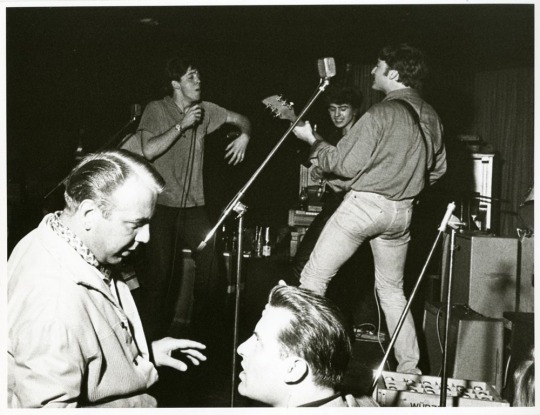
#the beatles#akom#beatles#fine tuning#tune in#paul mccartney#john lennon#lewisohn#jealous paul#cherry picking#mark lewisohn#Spotify
103 notes
·
View notes
Text

İA HABER AJANSI Son dakika… Meteoroloji, Valilik ve AKOM uyardı! Yarın başlayacak Cuma günü son bulacak https://www.iahaber.com/son-dakika-meteoroloji-valilik-ve-akom-uyardi-yarin-baslayacak-cuma-gunu-son-bulacak/139020/?utm_source=dlvr.it&utm_medium=tumblr www.iahaber.com https://iahaber.com
0 notes
Text
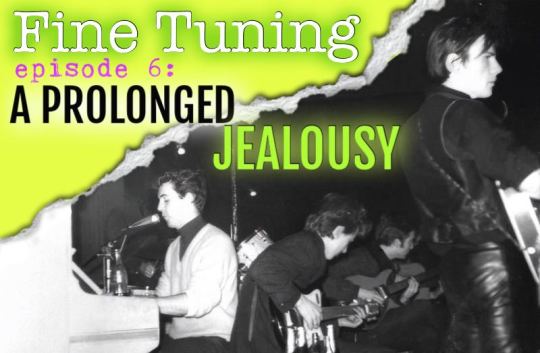
Fine Tuning: Ep 6 A Prolonged Jealousy
SYNOPSIS: In A Prolonged Jealousy, we tackle one of Tune In’s main talking points: that Paul McCartney is a fundamentally jealous person whose obsessive, one-sided jealousy of and over John Lennon was brought to a boil by the presence of Stuart Sutcliffe in the band.
Is Tune In’s unforgiving portrayal of Paul’s jealousy fair? or is it over the top? We’ll discuss!
UPDATE 11/21/23
A relevant piece of info that we did not include in our original airing of this episode has just come to our attention, and been added in (see episode notes on streaming platform for exact timestamp). We apologize for the initial oversight and extend our sincere thanks to the listener who brought this to our attention! You know who you are. :)
Listen HERE
80 notes
·
View notes
Text
#milestone#tumblr#post of the day#trending#communication#information technology#akom#cloudservices#voipservices#voipproducts#software#gsm gateway#pricard#voicelogger#usbheadset
0 notes
Text
Fine Tuning Ep 3 thoughts
I really liked this episode, more so than the last one which I also enjoyed. There are little things between them both which I kind of find to be a stretch that don’t really subtract from the point of the episodes (because of the sheer volume of the things that do check out)—like does Lewisohn have the musical knowledge to mean “natural talent” as a backhanded compliment, or is he not just a magical thinker regarding these great songwriters and the source of their talents lol. And I absolutely think Jim was describing Paul as a naughty child who knew how to plead his way out of music lessons or anything he wanted to with his dad, even if the point still stands that it’s weird for Lewisohn to have made the point of Paul “doing something wrong” in not wanting to take those music lessons…
First of all… Paul being described as creative *once* in the book after all of these eloquent descriptions of John’s unbridled edgelordiness is just wow. Paul is nothing if not creative and there’s so much to note about his inspirations leading to the colorful songs he’s written, which alongside getting to read these eloquent descriptions of John’s edgelordiness would just be really nice to read.
I ALSO find it very interesting how Paul might’ve felt inadequate about not going to the art institute in spite of being a promising painter according to everyone he knew (and how that might’ve put him off painting if I understood that point correctly)… because the whole art-institute situation and Paul’s perspective being working class is a perfect recipe for imposter syndrome, and has always seemed to be that way to me
And i know we (beatles people and me) don’t really think of Paul as self-depreciating but Lewisohn kind of ran with Paul saying about himself “Yeah I really thought I was the shit when I was a teenager, I thought I was an artist as if I could become an artist with my background LOL” as an accurate or deserved self-assessment of his actual skills versus as.. kind of self-depreciating comment or attempt to be humble?
Idk. Some of this is reminding me of how easy it is to misinterpret people’s words innocently or not—akom might take Jim’s words as a compliment towards Paul, Lewisohn can decide that Paul meant he really wasn’t genuinely interested in art and admits to being a poser, I can take that as Paul having imposter syndrome… idk it’s hard to tell what’s really meant sometimes
0 notes
Text
fic: all kinds of magic
by ifearimlosingtheroom (variationeighteen)
Summary: Amanda pulls a Tarot card everyday. She sees its truth in her friends at Smosh.
Notes: Uhhhhh wasn't expecting to post anything today for Amangela Week but I got in a writing mood so here we are. Launching this series with an Angela chapter for Amangela Week (hosted by @zillaphoneswag) Day 3: Workplace Shenanigans. Really pushing it here lmao. Is it romantic? Is it platonic? Up to y'all tbh. I'm tired from all the thinking.
Chapter 1: The Hermit



Rating: General Audiences
Archive Warnings: No Archive Warnings Apply
Fandoms: Smosh, Video Blogging RPF
Relationships: Angela Giarratana & Amanda Lehan-Canto, Angela Giarratana/Amanda Lehan-Canto (for now)
Characters: Amanda Lehan-Canto, Angela Giarratana (for now)
Additional Tags: Tarot Challenge, Amanda loves her friends
Word Count: 530
Read it here
13 notes
·
View notes